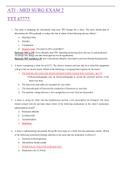Exam (elaborations)
ATI - MED SURG EXAM 2 - California State University, Long Beach TTT 67777
- Course
- Institution
ATI - MED SURG EXAM 2 TTT 67777 1. The nurse is preparing the discontinue long term TPN therapy for a client. The nurse should plan to discontinue the TPN gradually to reduce the risk of which of the following adverse effects? a. Hyperglycemia b. Diarrhea c. Constipation d. Hypoglycemi...
[Show more]



